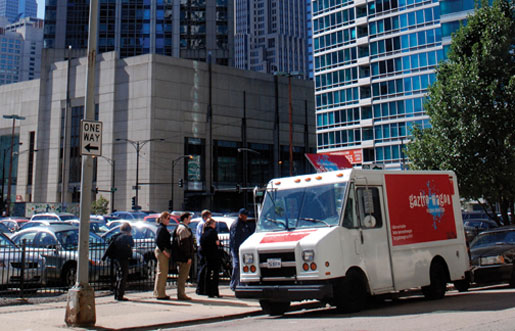Mobilizing: Can Chefs Get Chicago to Green-Light Food Trucks?
Anna Mowry
Anna MowryDecember 20, 2010

On the final day of the 2010 National Restaurant Association Show in Chicago, Mobi Munch—the country’s “first mobile food service infrastructure company,” according to its website—drove its slick prototype onto the “Food Truck Spot” pavilion. Attendees drifted in and out of the crimson red vehicle, which was souped up with gas heat, waste containment, and a POS system. A banner overhead rallied: “Take your eats to the streets with Mobi Munch!”
If an entrepreneur had been moved to buy the truck and speed off to launch his own itinerant eatery, he wouldn’t have made it beyond the parking lot: food trucks—specifically those from which chefs both prepare and serve food—are illegal on the Windy City’s streets. (The city does permit mobile vendors to sell prepackaged goods that were cooked in a licensed kitchen; about ten such law-abiding trucks exist.)
In a town that takes pride in its reputation for culinary innovation, this conspicuous absence has left many residents feeling deprived of a national trend—or, at least, of something palatable at their lunch hour. “I would love to have access to some novel and affordable lunch options,” said Lakeview resident Nora Schlesinger. “I’m sure I’m speaking for lots of foodies here when I say we are dying for something other than expensive sit-down restaurants, chain sandwich shops, and greasy fast food.”
Chicagoans’ wishes might be granted within the next few months, thanks, in part, to the efforts of local chef Matt Maroni. A former private-club chef who hails from Houston, Maroni has been working closely with his ward’s representative, Alderman Scott Waguespack, to educate the city council about the economic and cultural dividends of food trucks. And despite the draining bureaucracy—dramatic debates, endless revisions, meetings upon meetings—Maroni is upbeat. “It’s actually been a fast-paced process,” he said. “Probably because I wrote the ordinance myself.”
Indeed, Maroni typed up the entire 45-page proposal after researching the municipal code that governs the roving-restaurant industry in other major cities. His ordinance braids together what he believes are the most sensible strands of policy, including Seattle’s stipulation that all onboard chefs be sanitation-certified and New York’s multitiered mobile-food permit system, which sets separate standards for carts and for trucks. “In Houston, you drive your truck right up to a government building for a health inspection,” added Maroni. “I included that because we’re all about making this industry as easy for the city to monitor as possible.”
It’s also about simplifying mobile-food operations for chefs. Maroni drives the Gaztro-Wagon, a repurposed postal truck that he purchased from a Craigslist seller for $6,000. (Food-truck overhead is pocket change compared with the funds that chefs sink into their brick-and-mortar businesses, which is a big part of this new enterprise’s appeal.) After enlisting an electrician and a plumber to make his ride fit for foodservice, Maroni debuted the “naan-wich,” housemade naan rolled around a variety of savory sandwich fillings. “I have to prepare a day’s offerings in a separate kitchen, and naan keeps food nice and hot,” Maroni explained. “We do lots of braises and slow-cooked items because the texture holds up well.” If his ordinance passes, he’ll likely stick with his current menu (which includes the Fidel Caztro: smoked pork shoulder and ham with pickles, Manchego, and mustard), but “the logistics of everything won’t be as complicated.”
Philip Foss, another chef who tried to get his city council representative to consider loosening food-truck legislation, said the current law also makes profit-margin control a challenge for his own mobile business, Meatyballs. “Sometimes I make too many meatballs, sometimes too few—either way, I’m losing money. It’s a bit of a nightmare.”
But the city has its own concerns. “As I’ve researched this issue, one thing that comes up a lot is the prospect of territory wars between competing food trucks,” said Elizabeth Gomez, who works in Waguespack’s office as director of business and community outreach. Officials also see the potential for loading-zone conflicts: food trucks will have to stay out of areas where commercial vehicles park while making deliveries, but how will that be enforced? “The city council has many nuts-and-bolts questions, but I do think the ordinance is going to pass,” Gomez explained. “A lot of citizens ask us: ‘Why doesn’t the city have something like this?’ There’s definitely something simmering on the stove in Chicago.”
Maroni’s website, chicagofoodtrucks.com, has garnered more than 600 comments since it launched in March of this year; 97 percent of them express approval of the ordinance. “Almost every chef I speak to wants to do one,” said Foss. Even James Beard Award winners, like Grant Achatz and Paul Kahan, have hinted to reporters that they want to take their food on the road. Some chefs view food trucks as unwanted competition, however: Sheila O’Grady, president of the Illinois Restaurant Association, acknowledged that while the organization’s stance on the issue is still developing, its members are “split” over the proposal.
The Chicago city council was scheduled to vote on Maroni’s ordinance at its December meeting, but the usual labored politics postponed any action until early 2011. For Chicagoans, the day when full-fledged food trucks roam free can’t come soon enough. “Opening the roads to food trucks would only help make us a more exciting and dynamic food city,” says Heather Sperling, editor of Tasting Table Chicago. “Creative restaurants like Alinea, Avenues, Moto, and Graham Elliot have brought attention and acclaim to Chicago in the recent past. Why not let the creativity spread to the streets?”
This article originally appeared in the December/January 2011 issue of JBF Notes, the James Beard Foundation member newsletter. Don't miss out on future articles; become a member today!








